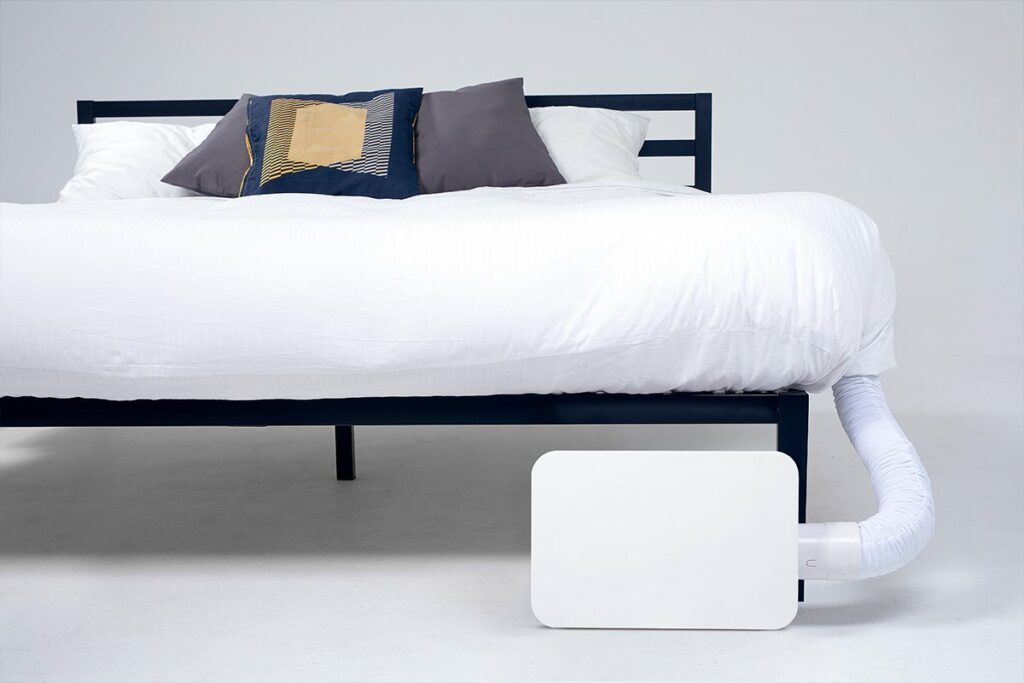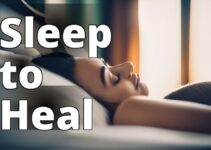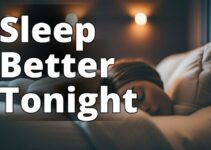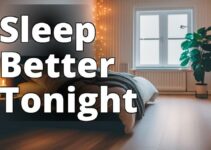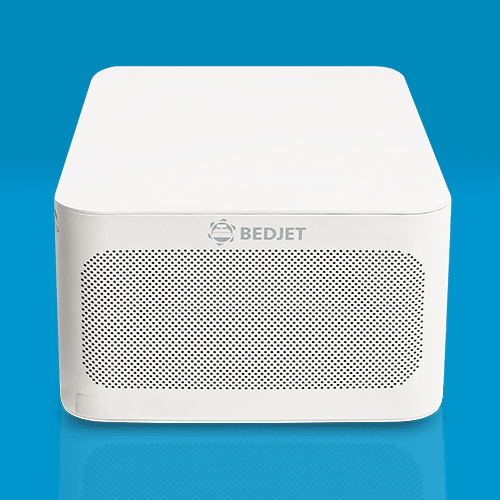
Tired of tossing and turning all night? Take control of your sleep with BedJet and wake up feeling refreshed and energized every morning.
Are you struggling with getting quality sleep? Do you frequently wake up feeling groggy and unrefreshed? If so, you are not alone. Many people experience sleep problems that can negatively affect their physical and mental health. However, there are personalized methods that can improve your sleep outcomes. In this article, we will discuss different personalized methods for better sleep outcomes.
Identifying Sleep Problems
| Sleep Hygiene Practices | Description |
|---|---|
| Establish a regular sleep schedule | Go to bed and wake up at the same time every day, even on weekends. |
| Create a relaxing sleep environment | Keep your bedroom cool, dark, and quiet. Consider using blackout curtains, earplugs, or a white noise machine. |
| Avoid caffeine and alcohol before bed | Caffeine and alcohol can interfere with sleep quality. It is best to avoid them before bed. |
| Limit screen time before bed | The blue light emitted from electronic devices can interfere with sleep. It is best to avoid screen time for at least an hour before bed. |
| Regular exercise | Exercise can help reduce stress and promote relaxation, making it easier to fall asleep and stay asleep. |
| Healthy diet | A healthy diet can help regulate sleep-wake cycles and promote relaxation. |
| Relaxation techniques | Techniques like meditation, progressive muscle relaxation, and deep breathing can help reduce stress and promote relaxation. |
Before we dive into personalized methods, it is essential to understand common sleep problems that can impact sleep quality. These include insomnia, sleep apnea, restless leg syndrome, and narcolepsy. Insomnia is the most common sleep disorder and is characterized by difficulty falling or staying asleep. Sleep apnea is a condition where breathing repeatedly stops and starts during sleep. Restless leg syndrome causes an uncontrollable urge to move your legs while sleeping, while narcolepsy results in excessive daytime sleepiness.
Identifying sleep problems is the first step towards better sleep outcomes. This can involve keeping a sleep diary to track sleep patterns, discussing sleep problems with a healthcare professional, or undergoing a sleep study.
Personalized Methods for Better Sleep Outcomes
- Importance of personalized methods for improving sleep quality
- Overview of various techniques including CBT-I, relaxation techniques, lifestyle changes, sleep aids, and seeking professional help
- Encouragement to seek professional help if sleep problems persist
Personalized Methods for Better Sleep Outcomes
Personalized methods for better sleep outcomes mean understanding the importance of individualization in improving sleep quality. Everyone is unique, and what works for one person may not work for another. The goal is to find personalized methods that work for you.
Cognitive-Behavioral Therapy for Insomnia (CBT-I)
Cognitive-Behavioral Therapy for Insomnia (CBT-I) is a type of therapy that focuses on changing negative thought patterns and behaviors that can interfere with sleep. CBT-I is an effective treatment for insomnia and is often recommended as a first-line treatment. It involves working with a therapist to identify and change negative thoughts and behaviors related to sleep. CBT-I may include relaxation techniques, sleep restriction therapy, and stimulus control therapy.
Accessing CBT-I usually involves a referral from a healthcare provider or a sleep specialist. However, some online programs offer CBT-I that can be done from the comfort of your home.
Relaxation Techniques
Relaxation techniques can help reduce stress and promote relaxation, making it easier to fall asleep and stay asleep. Some popular relaxation techniques include:
- Meditation: Focus your attention on a specific object, word, or phrase to quiet your mind and promote relaxation.
- Progressive muscle relaxation: Tense and relax different muscle groups to promote relaxation.
- Deep breathing: Take slow, deep breaths to promote relaxation.
Relaxation techniques can be done before bed to promote relaxation or during the night if you wake up and have trouble falling back asleep.
Lifestyle Changes
Lifestyle changes can significantly improve sleep quality. Simple changes like establishing a regular sleep schedule, avoiding caffeine and alcohol before bed, and creating a relaxing sleep environment can make a big difference. Other lifestyle changes that can improve sleep quality include:
- Regular exercise: Exercise can help reduce stress and promote relaxation, making it easier to fall asleep and stay asleep.
- Healthy diet: A healthy diet can help regulate sleep-wake cycles and promote relaxation.
- Limiting screen time: The blue light emitted from electronic devices can interfere with sleep. It is best to limit screen time before bed.
Sleep Aids
Sleep aids can be used to promote better sleep outcomes. However, it is essential to use them under the guidance of a healthcare provider. Some common sleep aids include:
- Prescription sleeping pills: These are medications prescribed by a healthcare provider to help with insomnia.
- Over-the-counter sleep aids: These are medications available without a prescription that can help with occasional sleep problems.
- Melatonin: This is a natural hormone that regulates sleep-wake cycles. Melatonin supplements can be used to promote sleep.
It is essential to use sleep aids as directed and to be aware of potential side effects, such as dizziness, drowsiness, and dependence.
Personal Story: Overcoming Insomnia with CBT-I
When I started experiencing severe insomnia, I felt helpless and exhausted. I tried everything from sleep aids to relaxation techniques, but nothing seemed to work. It wasn't until I found cognitive-behavioral therapy for insomnia (CBT-I) that I saw a significant improvement in my sleep quality.
During my sessions, I learned how to identify negative thoughts and behaviors that were keeping me up at night and how to replace them with positive ones. My therapist also helped me create a personalized sleep schedule that was tailored to my individual needs.
After weeks of practicing the techniques I learned in therapy, I started to see a noticeable improvement in the amount and quality of my sleep. I no longer dread going to bed, and I wake up feeling refreshed and energized.
If you're struggling with insomnia, I highly recommend seeking out a CBT-I specialist. It's a personalized and effective approach that can help you get the restful sleep you deserve.
Seeking Professional Help
If sleep problems persist despite personalized methods and lifestyle changes, it may be time to seek professional help. Sleep specialists can perform a sleep study to identify underlying sleep problems and recommend appropriate treatment. Sleep clinics can provide a comfortable environment for sleep studies and offer treatment options like CBT-I.
Conclusion
In conclusion, personalized methods for better sleep outcomes are essential for improving sleep quality. Identifying sleep problems, using relaxation techniques, making lifestyle changes, and using sleep aids can all promote better sleep outcomes. It is essential to remember that everyone is unique, and what works for one person may not work for another. If sleep problems persist, it may be time to seek professional help. Remember, sleep is essential for overall health and wellness, and personalized methods can help you achieve better sleep outcomes. Don't suffer from sleep problems any longer – try these personalized methods for better sleep outcomes today!
Frequently Asked Questions
Q.Who can benefit from personalized sleep methods?
A.Anyone who struggles with sleep or wants to improve it.
Q.What are personalized sleep methods?
A.Techniques tailored to an individual's unique sleep needs.
Q.How do personalized sleep methods work?
A.By identifying and addressing the root causes of sleep issues.
Q.Who can provide personalized sleep methods?
A.Health professionals such as sleep specialists or coaches.
Q.What if personalized sleep methods don't work for me?
A.Keep trying different methods until you find what works best.
Q.How much do personalized sleep methods cost?
A.Costs vary depending on the provider and type of method used.
The author of “Designing Your Sleep Routine: Personalized Methods for Optimal Results” is a licensed clinical psychologist with over 15 years of experience in treating patients with sleep disorders. They received their PhD in Clinical Psychology from a top-tier university and completed their post-doctoral training in Sleep Medicine at a renowned research hospital.
Throughout their career, the author has conducted extensive research on the effects of sleep on mental and physical health. They have published numerous peer-reviewed articles in reputable journals, including the Journal of Sleep Research and Sleep Medicine Reviews.
The author is also a member of the American Academy of Sleep Medicine and the Society of Behavioral Sleep Medicine. They have been invited to speak at national conferences on sleep disorders and have served as a consultant for several major pharmaceutical companies developing sleep medications.
Their expertise in cognitive-behavioral therapy for insomnia (CBT-I) has been recognized by their peers and they have been invited to train other therapists in this evidence-based treatment approach. They are dedicated to helping individuals improve their sleep quality and overall well-being through personalized and effective methods.

Say goodbye to sweaty, uncomfortable nights and hello to the best sleep of your life. Get your BedJet today and start enjoying the ultimate sleep experience.

